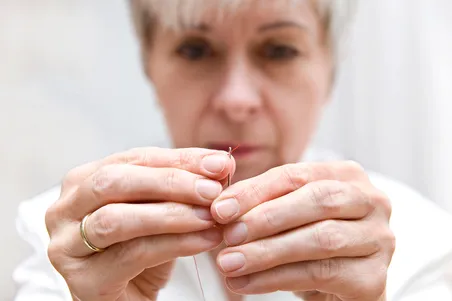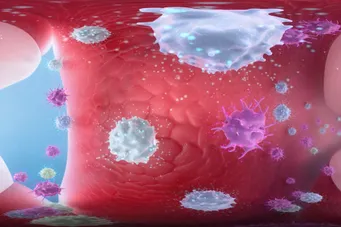Inside the Visit: Rheumatoid Arthritis
Reviewed by Poonam Sachdev on February 18, 2022
Video Transcript
[MUSIC PLAYING]
ZUHAL ARZOMAND: Good morning,
Jessica.
Tell me about the joint pain
that you've been having.
JESSICA: So I get a lot of the stiffness here and in my wrist-- and the swelling in the knuckles.
ZUHAL ARZOMAND: OK, that's a very common area, actually, for the rheumatoid arthritis. So have you noticed any particular times where your joint pain is worse or when you're getting flare-ups?
JESSICA: Yes, the mornings are really the worst. That's when I get a lot of stiffness and swelling. I have young kids. They keep me busy. With my kids waking up so early in the morning, it makes it really difficult for me with my hands being really stiff. It really slows me down in the morning when I'm trying to get up and get going with them.
ZUHAL ARZOMAND: So, Jessica, it's really great that you came in today, especially since you know your joints have been bothering you a lot. Usually when patients come in early and we start treatment early on, it actually is beneficial to them for the long run.
JESSICA: What are my treatment options?
ZUHAL ARZOMAND: Thankfully today we have a lot of treatment options that are available to us. We have options for oral therapy as well as injection therapy. There are also some infusions that you can get. And really the goal for us is to give you a medication that will help stop the inflammation, stop the pain and the stiffness, and really prevent joint damage.
JESSICA: So I'm 29. I thought this was something that old people get.
ZUHAL ARZOMAND: Yeah, and that's a common misconception. So usually with a lot of our autoimmune diseases, every disease is a little bit different on what age patients will get diagnosed or when their pain and stiffness will start. Usually for rheumatoid arthritis, it's in the mid-age-- 20 to 40s. So there are exceptions though. So sometimes very young people can get rheumatoid arthritis. And even some much older patients can get diagnosed with rheumatoid arthritis much later in life.
JESSICA: So my mom actually has rheumatoid arthritis. Is this something she could have passed on to me?
ZUHAL ARZOMAND: Yeah, so that's a great question. Usually if you have the genes for rheumatoid arthritis and then there's also maybe an infection-- either a bacterial or a viral-- or even some environmental factors, those will actually kind of trigger the disease to start.
JESSICA: Is there anything I should do in my day-to-day living to prevent this getting worse?
ZUHAL ARZOMAND: Exercise is very important for patients who have a chronic inflammatory arthritis. We want to make sure you maintain your muscle strength. So even doing weight-bearing exercises or even just walking at least three times a week is really helpful. And that's really to help increase your muscle strength so that way you offload a little bit for the joints.
I usually recommend an overall very healthy diet. Usually what I like to tell patients is a Mediterranean diet full of seeds, nuts, whole grains, a lot of fish in the diet. There are some supplements that people take like fish oils or omega-3. Sometimes even turmeric has been known to have some antioxidant benefits. But of course, you always want to just make sure it's OK with your doctor before you start taking anything in particular.
I'm glad you came in today. I think we'll work together and we'll really try to help you feel better overall. So that way you can take care of your kids and take care of yourself as well.
JESSICA: Thank you.
JESSICA: So I get a lot of the stiffness here and in my wrist-- and the swelling in the knuckles.
ZUHAL ARZOMAND: OK, that's a very common area, actually, for the rheumatoid arthritis. So have you noticed any particular times where your joint pain is worse or when you're getting flare-ups?
JESSICA: Yes, the mornings are really the worst. That's when I get a lot of stiffness and swelling. I have young kids. They keep me busy. With my kids waking up so early in the morning, it makes it really difficult for me with my hands being really stiff. It really slows me down in the morning when I'm trying to get up and get going with them.
ZUHAL ARZOMAND: So, Jessica, it's really great that you came in today, especially since you know your joints have been bothering you a lot. Usually when patients come in early and we start treatment early on, it actually is beneficial to them for the long run.
JESSICA: What are my treatment options?
ZUHAL ARZOMAND: Thankfully today we have a lot of treatment options that are available to us. We have options for oral therapy as well as injection therapy. There are also some infusions that you can get. And really the goal for us is to give you a medication that will help stop the inflammation, stop the pain and the stiffness, and really prevent joint damage.
JESSICA: So I'm 29. I thought this was something that old people get.
ZUHAL ARZOMAND: Yeah, and that's a common misconception. So usually with a lot of our autoimmune diseases, every disease is a little bit different on what age patients will get diagnosed or when their pain and stiffness will start. Usually for rheumatoid arthritis, it's in the mid-age-- 20 to 40s. So there are exceptions though. So sometimes very young people can get rheumatoid arthritis. And even some much older patients can get diagnosed with rheumatoid arthritis much later in life.
JESSICA: So my mom actually has rheumatoid arthritis. Is this something she could have passed on to me?
ZUHAL ARZOMAND: Yeah, so that's a great question. Usually if you have the genes for rheumatoid arthritis and then there's also maybe an infection-- either a bacterial or a viral-- or even some environmental factors, those will actually kind of trigger the disease to start.
JESSICA: Is there anything I should do in my day-to-day living to prevent this getting worse?
ZUHAL ARZOMAND: Exercise is very important for patients who have a chronic inflammatory arthritis. We want to make sure you maintain your muscle strength. So even doing weight-bearing exercises or even just walking at least three times a week is really helpful. And that's really to help increase your muscle strength so that way you offload a little bit for the joints.
I usually recommend an overall very healthy diet. Usually what I like to tell patients is a Mediterranean diet full of seeds, nuts, whole grains, a lot of fish in the diet. There are some supplements that people take like fish oils or omega-3. Sometimes even turmeric has been known to have some antioxidant benefits. But of course, you always want to just make sure it's OK with your doctor before you start taking anything in particular.
I'm glad you came in today. I think we'll work together and we'll really try to help you feel better overall. So that way you can take care of your kids and take care of yourself as well.
JESSICA: Thank you.



